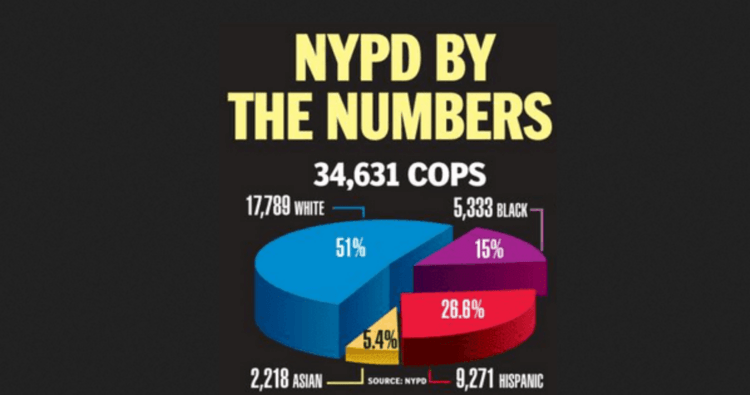


By Steve Sailer
06/11/2015
From an article about a public official telling the truth:
NYPD chief Bratton says hiring black officers is difficult: ‘So many have spent time in jail’
New York police commissioner says bringing more non-white officers into force is challenging because many African American men have criminal records
Hiring more non-white officers is difficult because so many would-be recruits have criminal records, the New York police commissioner, Bill Bratton, has said.
“We have a significant population gap among African American males because so many of them have spent time in jail and, as such, we can’t hire them,” Bratton said in an interview with the Guardian.
Another way of looking at it is that black cops are roughly in proportion to their race’s percentage of law-abiding citizens in the NYC commuting zone, but not in proportion to the black race’s share of total criminals in NYC.
When the usual furor started, Bratton told the NY Daily News:
So far, William Bratton, age 67, has been strikingly invulnerable to social justice hate mobs over the decades.
This is probably because he has presided over crime declines as top cop in Boston, New York, and Los Angeles. Those are cities where important citizens live. They are not podunk burghs like Ferguson. So leftist Bill de Blasio hired him to run the NYPD again.
Bratton is both a slick politician and rather more of a straightshooter than we’re used to these days. At least outside U.S. territory. For example, here’s a blunt, wise 2006 interview that Bratton gave Linda Frum of the Canadian news magazine Maclean’s regarding Toronto’s crime problem:
Q. [Frum] So you know a little bit about our city? You know about our problems? A 27-per-cent increase in the number of homicides from 1995 to today. A Boxing Day slaying where a 15-year-old innocent bystander was gunned down during a gang shootout on a major shopping street. Can I tell you — it would be nice if you were our police chief.
A. [Bratton] Well, thank you. Tell me, the gang violence that you are experiencing, what is the racial or ethnic background of the gangs?
Q. That’s a refreshingly blunt question. Some say it may be as high as 80 per cent Jamaican. But no one knows for sure, because people here don’t like to talk about that.
A. You need to talk about it. It’s all part of the issue. If it’s Jamaican gangs that are committing the crimes, well then, go after the Jamaican gangs. And don’t be afraid to go after them because they’re black. That’s the last thing you need to be concerned with.
Q. Oh boy, I can see the complaints coming in already. You have to understand the climate here. The major local daily in Toronto, the Toronto Star, says it doesn’t believe in “gratuitously” labelling people by ethnic origin.
A. Well, that really helps identify who they are, doesn’t it? The next step will be to refuse to allow the police to identify people by their race or ethnic origin. That type of societal consciousness really goes to extremes. …
Q. The Broken Windows approach to policing is assertive and increases the frequency of interaction with citizens on a daily basis. Is it a method of policing that is possible only with the right political will behind it?
A. Political will is absolutely critical. In other words, if your government, your society, is saying, “We don’t want you focusing on the little things because we’re concerned it might be seen as racially incorrect,” or, “We’re concerned that it’s not appreciative of the ethnic backgrounds of people” — well, that’s the lame excuse that got American policing into so much trouble in the ’60s, ’70s and ’80s. The attitude was, “We’re not going to police some of these minor crimes in the minority neighbourhoods. After all, what’s the harm? There are really no victims to prostitution, or gangs hanging on the corner and drinking.” But what we didn’t understand was that the victim was the neighbourhood. It was like a cancer eating away at that neighbourhood. And all the people who lived there were ultimately the victims as their neighbourhoods deteriorated. It’s guaranteed that if you don’t control those minor types of violations, you are going to create a climate in which the people perpetrating them are emboldened to try and get away with more…
Q. Rather than focus on social and economic causes, you’ve said in the past that one of the most important ways to reduce crime is to go after narcotics …
A. Well, what are the Jamaican gangs up there fighting over — who controls the drug trade?
Q. Yes.
A. Exactly. So to do it, they are going to do the same thing they do down in Jamaica, which is resort to violence as the first way of dealing with it. Whether it’s your Asian gangs that are trying to control the gambling or your gangs coming in from Eastern Europe trying to control the credit card fraud, they all have their specialties. It comes back to core principles. The criminal justice system, if properly co-ordinated, and properly supported politically and publicly, can in fact control crime. And the way you control crime is through controlling behaviour.
Q. So the situation in Canada is far from hopeless …
A. The good news is we know what to do about crime. You need to have political leaders, police chiefs, and the community working together, under the community policing partnership principle. You need to develop priorities and develop focus. And also go from the underlying understanding that crime is caused by individual behaviour.